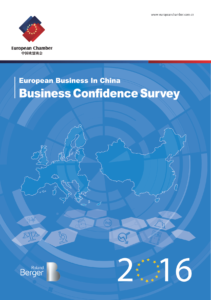 The purpose of the European Chamber’s European Business in China Business Confidence Survey is to take an annual snapshot of European companies’ successes and challenges in China. Published since 2004, the survey has enabled the European Chamber to build a rich data set to serve as a broad indicator for how European companies judge the business environment in China, both now and in the future.
The purpose of the European Chamber’s European Business in China Business Confidence Survey is to take an annual snapshot of European companies’ successes and challenges in China. Published since 2004, the survey has enabled the European Chamber to build a rich data set to serve as a broad indicator for how European companies judge the business environment in China, both now and in the future.
Launched on 7th June, 2016, this year’s survey reports that while Chamber member companies are increasingly pessimistic and perceive China’s reform progress to have stalled, a clear majority would likely increase their investment if they were granted expanded market access.
Executive Summary
China’s economic slowdown continues to pose a significant challenge to both Chinese and European companies.[1] However, a business environment that is increasingly hostile and a playing field that is perpetually tilted in favour of domestic enterprises means the effects of the slowdown are intensified for European business. Beijing’s failure to deliver on promises that foreign-invested enterprises (FIEs) will enjoy a more open, competitive market has triggered a fresh wave of pessimism, with 41% of European companies now re-evaluating their China operations and planning to cut costs, including through headcount reduction.
More than half of the respondents in the Business Confidence Survey 2016 report that doing business in China is becoming more difficult year-on-year. Entrenched anti-competitive policies and a failure to enact tangible reforms in crucial areas such as rule of law, eliminating local protectionism, removing market access barriers, reigning in overcapacity and tackling high levels of domestic debt are just some of the key reasons. To date, the symbolism of the Third Plenum’s Decision[2] has trumped substance.
Pessimism about the business outlook for China operations of European companies has reached an all-time high, with 31% of respondents bearish about their profitability – an eight-point increase over 2015 figures. Another 15% of respondents report concern about company growth, which is seven percentage points higher than last year. Anxiety over the increasing difficulties of conducting business in China is particularly pronounced in the information technology and telecommunications, machinery and chemicals sectors. Additional market access barriers account for the first two sectors, whereas as a continued worsening of overcapacity accounts for the latter.
After 35 years of dynamic economic development it is natural that the pace of growth should ease off in China, a process that is already well underway. Despite this, China remains a significant investment destination for European companies with 47% reporting that they plan to expand their operations. However, it is noteworthy that this represents a nine-point decrease from 2015. Furthermore, only three years ago a staggering 86% of European companies were intending to expand operations, which provides an even more sobering perspective.
In fact, European investment in China is down about 9% overall from 2014, to EUR 9.3 billion in 2015, suggesting that China is losing its privileged position in the investment portfolios of many European companies. This contrasts starkly with the staggering EUR 20 billion that China invested in Europe in 2015, a 44% leap from 2014.[3] However, while the slowdown in economic growth is the primary reason that respondents are scaling back their investment plans, concerns over the nation’s growing debt, slowing exports and dwindling returns on investment—particularly in sectors burdened by overcapacity[4]—make it clear that this is by no means the only reason.
As China looks to ease the transition of its economic model towards one based on qualitative growth, the government has repeatedly promised to enact reforms aimed at shifting the market to the heart of the nation’s economy. But here too European firms have been disappointed with the resolve that has been demonstrated. In fact, it often seems that Beijing is moving in the opposite direction, promulgating vaguely-worded, security-related laws[5] and strangling Internet access to the point of harming domestic as well as international businesses.
Yet in the face of these considerable challenges European companies have continued to post reasonable business performance overall, with more than half of the respondents reporting increased revenues for 2015. This is indicative of the tenacity of European companies and their experience in successfully navigating choppy economic waters. Most European firms also remain committed to China with only 11% of respondents saying they have made plans to shift investment to other markets, although 41% anticipate having to cut costs in response to the current business climate. As previously alluded to, headcount reduction is one of the primary methods that will be used to decrease overheads.
Although pronouncements made in the Decision committing to a market economy, and gradualist reform efforts such as the once-hailed pilot free trade zones initially piqued great interest among European companies, the absence of concrete developments has deepened their disillusionment in China’s reform agenda, the extent of which can be seen from the following figures:
- 56% of respondents are of the view that doing business in China has become more difficult, a five-point increase from 2015.
- 57% report that foreign companies tend to receive unfavourable treatment compared to domestic Chinese companies.
- 57% of respondents believe that environmental regulations are strongly enforced against foreign companies, while only 14% think that they are strongly enforced against Chinese state-owned enterprises and only 12% think that this is the case with privately-owned Chinese companies.
- 58% of respondents state that the recent tightening of Internet controls and access restrictions has a negative impact on their business, a 17-point jump from 2015.
- 40% of respondents feel that foreign companies are being discriminated against through recently promulgated national-security-related legislation.
- 70% of respondents do not feel more welcome in China than they did 10 years ago.
These issues undermine China’s efforts to foster the innovation it needs in order to develop more globally competitive companies and new strategic industries. A major area of concern for China is that European companies’ investment in research and development (R&D) remains low: only 28% of respondents have a R&D centre in Mainland China, which is indicative of European distrust of China’s vague and arbitrary legal system – effective enforcement of intellectual property rights throughout China’s provinces is highly inconsistent. Nearly half of respondents report that China’s R&D environment is less favourable than the worldwide average, which is reflected in a sharp drop in European companies willing to invest in R&D, from 85% in 2015 to 72% in 2016.
Looking ahead, European business hopes the 13th Five-Year Plan (FYP) will be used to guide and support the development of a fairer and more open Chinese marketplace, to the benefit of all. The European Chamber believes that only by creating such conditions will China successfully steer a course through these more economically challenging times. European business also still feels strongly about the Third Plenum’s reform promises, though this survey clearly reflects that respondents hold doubts over whether these long-vowed and necessary reforms will ever take place.
European companies are also now counting on a successful conclusion to the EU-China Comprehensive Agreement on Investment negotiations, to improve the business environment and reduce market access barriers. Firms hope to be provided with a clear schedule outlining when they will be able to take greater control of their China-based operations, making it easier to undertake strategic acquisitions as well as allowing them to enter new business areas or product segments.
There is an important precedent for this. In 2001, China’s accession to the World Trade Organisation (WTO) provided a roadmap and the legal framework that gave more European companies the assurances they needed to either enter the Chinese market or expand their existing operations, leading to a decade of unparalleled growth. We now need to see a new landmark development that will imbue European business with the confidence it needs to recommit to China’s future development.
It is telling that the Organisation for Economic Cooperation and Development (OECD) ranked China last among the 58 countries it includes in its Foreign Direct Investment Regulatory Restrictiveness Index. This is not a mere stigma that China needs to shed, it is a very real problem that must be addressed in order to establish and maintain higher quality growth and boost innovation. The Chinese economy is facing increasingly stronger headwinds and needs to attract more high value-add investment from European companies. Substantial market reforms are therefore no longer an option, they are a necessity.
To download a copy of the European Business in China Business Confidence Survey 2016 please go to www.europeanchamber.com.cn/en/publications-business-confidence-survey-2016.
[1] It is important to note that this slower growth is in part due to a higher economic base after three decades of breakneck development.
[2] Decision of the Central Committee of the Communist Party of China on Some Major Issues Concerning Comprehensively Deepening the Reform, (Decision), China.org.cn, 16th January, 2014, viewed 25th April, 2015, <http://www.china.org.cn/china/third_plenary_session/2014-01/16/content_31212602.htm>
[3] A New Record Year for Chinese Outbound Investment in Europe, Rhodium Group, February, 2016, viewed 19th April, 2016, <http://rhg.com/wp-content/uploads/2016/02/A_New_Record_Year_for_Chinese_Outbound_Investment_in_Europe.pdf>
[4] A highly significant 92% of respondents believe that a commitment to utilising market forces is necessary if overcapacity issues in China are to be successfully resolved.
[5] Over the past year China has issued a slate of national-security-related legislation, such as the National Security Law, the Counter-terrorism Law, the Cyber Security Law and the Trial Measures for the National Security Review of Foreign Investments in China’s Pilot Free Trade Zones. Common to these laws and regulations is vague wording and a broad scope, which combine to create a great deal of uncertainty for business. In a press release dated 3rd June, 2015, the European Chamber said that in sum these laws amount to a “massive national security overreach”.


Recent Comments